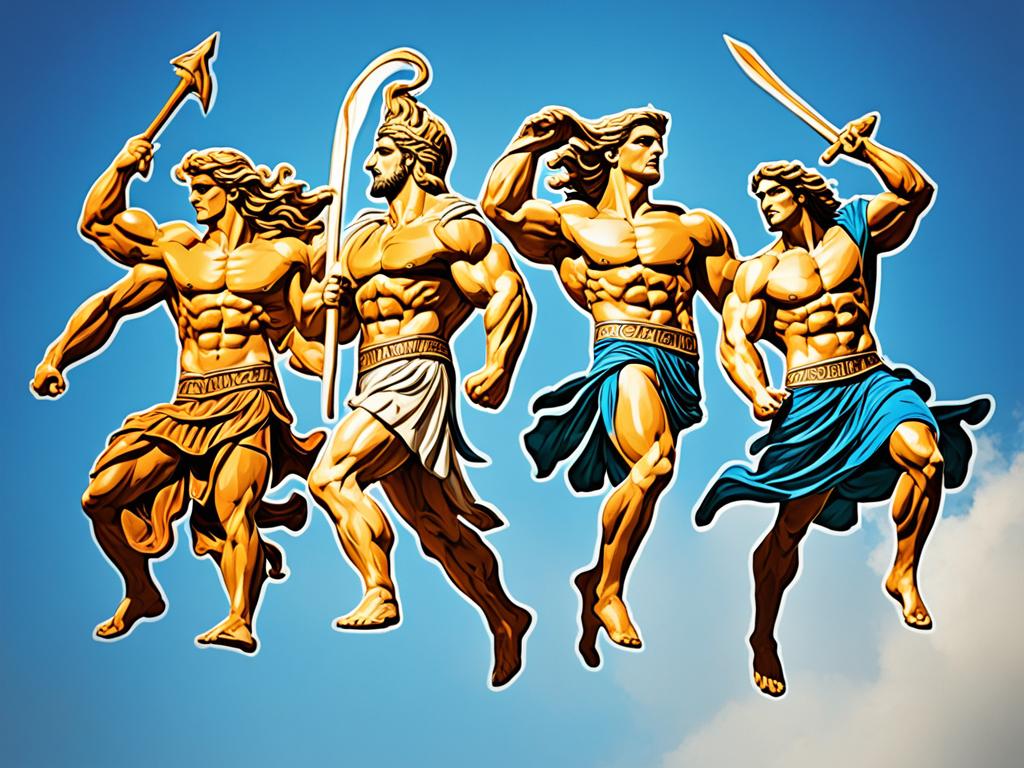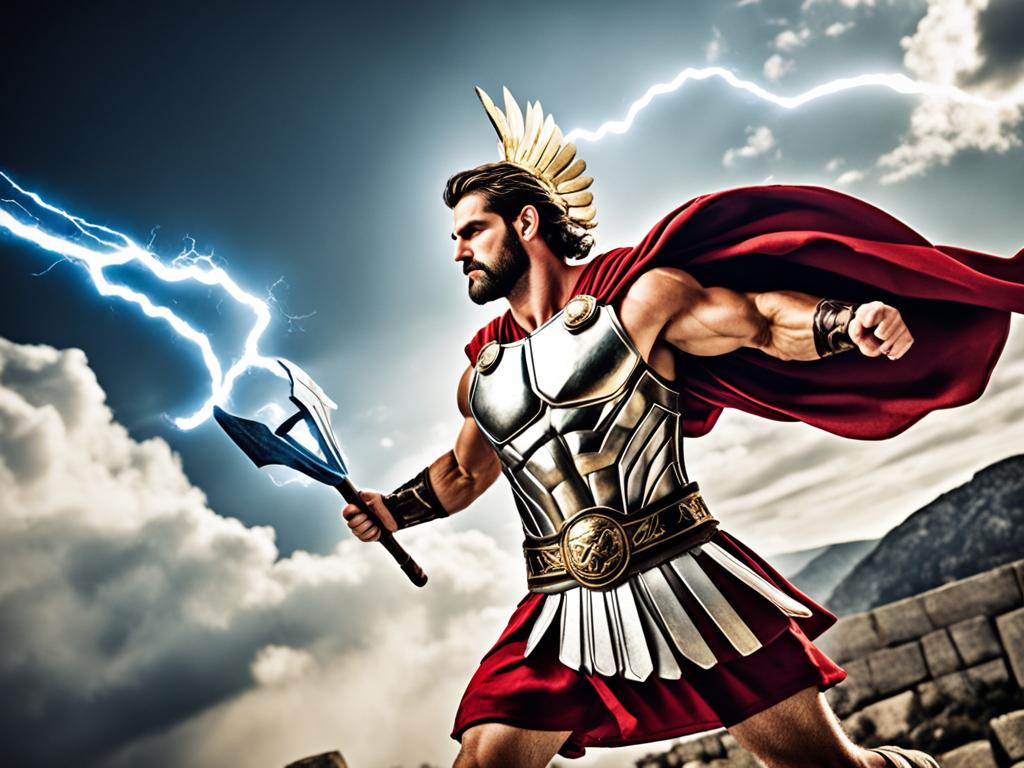Adverts
Welcome! Embark on this journey with us as we uncover the fascinating secrets of Greek mythology. We will know the greek gods, the myths and legends that make up this universe rich in history and adventures. Get ready to dive into Mount Olympus and unravel the mysteries of Zeus, Ivy, Aphrodite, Hades and many other amazing characters.
A Greek mythology has always aroused curiosity and wonder, and is an essential part of Ancient Greek culture. Through these stories, we understand the beliefs, values and ideals that shaped this influential civilization.
Adverts
As we explore the greek gods, we will understand their unique characteristics, powers and their complex relationships. We will also come into contact with the intriguing mythology that surrounds Olympus, the divine realm where these gods dwell.
But that's not all! We'll also delve deeper into the greek heroes, courageous figures who defied adversity and demonstrated greatness in epic battles. We will learn about their exciting adventures and legendary deeds.
Adverts
Get ready for an engaging and knowledge-filled read. Greek mythology is a cultural treasure that continues to inspire and fascinate people around the world to this day. Join us on this journey and uncover the secrets of one of the most beautiful and impactful mythologies in history!
Key insights:
- Greek Mythology is rich in gods, myths and legends.
- The Mount Olympus is the home of the greek gods.
- Zeus, Ivy, Aphrodite, Hades are some of the main Greek gods.
- You greek heroes are known for their legendary feats.
- Greek mythology continues to influence today's culture.
The Greek Gods
In this section, we will delve into the fascinating world of the Greek gods. We will explore their defining characteristics, the compelling stories that surround them, and the importance they hold in Greek mythology. Get ready to uncover the secrets of the most powerful gods who inhabit Mount Olympus and influence the lives of mortals.
One of the best known gods in Greek Mythology is Zeus, the powerful lord of Olympus and god of the sky and thunder. He is often depicted with a thick beard and holding a thunderbolt, symbolizing his power over the natural world. Ivy, his wife, is the queen of the gods and protector of marriage and family.
Aphrodite is the goddess of love, beauty and passion, capable of seducing both gods and mortals. Already Hades is the god of the underworld, responsible for the kingdom of the dead. He is usually depicted with a serious and somber expression, sitting on his throne surrounded by lost souls.
Other important gods include Poseidon, the god of the sea and earthquakes, and Ares, the god of war. Greek mythology is full of captivating characters, each with their own unique quirks and powers.

Explore the table below to learn more about the main Greek gods and their attributions:
| God | Assignment |
|---|---|
| Zeus | God of the heavens, thunder and kings |
| Ivy | Goddess of marriage and family |
| Aphrodite | Goddess of love and beauty |
| Hades | God of the underworld |
| Poseidon | God of the seas and earthquakes |
| Ares | God of war |
These are just a few examples of the many Greek gods that make up the Olympian pantheon. Each one plays a unique role in the mythological stories and beliefs of the ancient Greeks, helping to explain natural phenomena, human behavior, and honoring human virtues and vices.
Mythological Heroes
In this section, we will explore the mythological heroes of Ancient Greece. Over the centuries, these heroes have captured people's imaginations with their extraordinary feats, exciting adventures, and legendary deeds. greek heroes They are brave and courageous figures, often helped by the gods in their heroic journeys.
One of the most famous heroes in Greek mythology is Hercules. Known for his superhuman strength and unparalleled bravery, Hercules faced countless challenges, including performing the Twelve Labors. His stories are action-packed and have inspired many works of art and literature over the centuries.
Another legendary hero is Perseus, famous for cutting off the head of the terrible Medusa. With the help of the gods and magical objects, Perseus embarked on a dangerous quest to save a princess and defeat terrifying creatures. His story is full of danger and exciting twists and turns.
Achilles, on the other hand, is known for his invulnerability, except for his heel. He distinguished himself in the Trojan War as the bravest of warriors. His tragic legend has been a frequent theme in art and literature over the years.
These are just a few examples of the Greek heroes whose stories have been told and retold over the centuries, leaving a lasting legacy in the culture and collective imagination. Their courage, strength and extraordinary abilities continue to inspire people of all ages.
| Hero | Description |
|---|---|
| Hercules | Known for his superhuman strength and performance of the Twelve Labors |
| Perseus | Famous for cutting off the head of the terrible Medusa and saving a princess |
| Achilles | He stood out as the bravest warrior in the Trojan War. |
These Greek heroes are just a sample of the vast universe of Greek Mythology, which continues to enchant and intrigue people to this day.

Conclusion
After exploring the secrets of Greek mythology and learning about its gods and heroes, it’s clear that this rich tradition still exerts a powerful influence on our culture today. Greek mythology continues to enchant and fascinate people of all ages. Learning about Zeus, Hera, Aphrodite, and the other Olympian gods transports us to an age of wonder and adventure.
Greek mythology is much more than just fantastical stories. It helps us understand the very essence of Ancient Greece, its worldview, its moral values, and even its explanations for natural phenomena. In addition, many mythological elements and characters are frequently referenced in various forms of art and literature.
Exploring Greek mythology is like diving into a universe full of intrigue, love, betrayal, epic battles and life lessons. It is about discovering how the gods and heroes shaped ancient Greek civilization and left a legacy that endures to this day. Therefore, there is no doubt that Greek mythology is a cultural treasure and an inexhaustible source of inspiration.
FAQ
What is Greek mythology?
Greek mythology refers to the stories, legends, and beliefs of the ancient Greeks. It describes the pantheon of gods, myths, and legends that make up the rich mythological tradition of Ancient Greece.
Who are the main Greek gods?
There are several important Greek gods, such as Zeus, the king of the gods; Hera, the queen of the gods; Aphrodite, the goddess of love and beauty; Hades, the ruler of the underworld; among others.
What is Mount Olympus?
Mount Olympus is known as the highest mountain in Greece and is also considered the home of the gods in Greek mythology. It is there that the gods would meet to rule and make important decisions.
Who are the Greek heroes?
Greek heroes are legendary figures who performed heroic and courageous deeds. Some famous examples are Hercules, known for his superhuman strength; Perseus, who defeated Medusa; Achilles, one of the heroes of the Trojan War; and many others.
How did Greek mythology influence culture?
Greek mythology has had a strong influence on art, literature, theater, and even the way we understand the world today. Its stories and characters continue to be references in various cultural works and have served as inspiration for many writers, artists, and philosophers throughout history.
Where can I learn more about Greek mythology?
There are several sources where you can learn more about Greek mythology. Specialized books, such as mythographies and collections of greek myths, are great options. In addition, there are also documentaries, online courses and museums that address the topic in an in-depth and interesting way.
